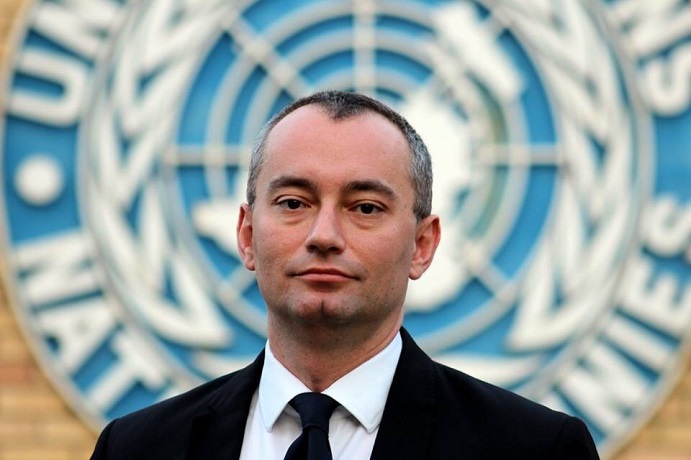Middle East Monitor / October 31, 2019
It would be good if the UN Special Coordinator for the [so-called] Middle East Peace Process, Nickolay Mladenov, defined his statement to the UN Security Council regarding Gaza, and which can be applied to all Palestinians. The top priority is the humanitarian crisis, he declared, but “the core of the crisis in Gaza is political.”
The UN pushed Palestinians into a humanitarian crisis by approving and supporting the foundations of the Zionist colonial project. Decades after the 1947 Partition Plan, the international community forced the two-state compromise upon the people of Palestine, reaping more of their dispossession for Israel’s benefit. As a major beneficiary of international aid, the Palestinian Authority has routinely reminded the world to retain its commitment to the two-state imposition, regardless of the damage it does to Palestinians’ political rights.
Humanitarian aid is supposed to be a temporary endeavour. The UN’s unconditional support for Israel dispels this premise. Palestinian dependence on humanitarian aid is now the primary political concern for the international community. This is the missing link from Mladenov’s speech; to ensure political dominance over the conditions that require humanitarian aid. In return, Palestinians are exploited perpetually to preserve the two-state compromise which the international community has enshrined as “the only solution”, supported by the PA.
UN officials are not in short supply for “highlighting humanitarian gains”. Behind this façade, however, lies the magnitude of the problem. Israel’s colonial presence in Palestine is the reason why Palestinians became recipients of humanitarian aid. If the UN is still speaking of gains rather than accomplishments, it is evident that there is political consensus to ensure that the Palestinians are prevented from overcoming the deprivation enforced upon them. Dependence on humanitarian aid is one of the reasons why politics remain fragmented in Palestine, especially with the PA seeking to control Gaza through imposing sanctions and adding to an already precarious situation.
While the UN ramped up its assertions that Gaza will become unliveable after 2020 in the aftermath of Israel’s Operation Protective Edge military offensive, a 2012 UN report had already stipulated the possibility. It is clear that the damage inflicted by Israel upon Palestinians in the enclave supersedes the humanitarian assistance provided by the international community. Is the humanitarian crisis a priority for the UN, or would it rather ensure that the crisis remains complementary to Israel’s colonial violence?
In his latest report to the UN General Assembly, Special Rapporteur Michael Lynk stated: “The international community has issued countless resolutions and declarations critical of the never-ending Israeli occupation. The time has long passed to match these criticisms with effective consequences.”
This is, undoubtedly, too much to ask of the international community. To lose its position as an interlocutor for Palestinians, which deprives them of a voice, is to allow their political demands to be articulated by the people of Palestine themselves. The UN needs subjugated Palestinians and it will continue to aid Israel in the production of these conditions by giving it a green light for its violence and then making sure that within international discourse, the mere mention of Palestinians remains synonymous with humanitarian aid.
Ramona Wadi is an independent researcher, freelance journalist, book reviewer and blogger. Her writing covers a range of themes in relation to Palestine, Chile and Latin America













